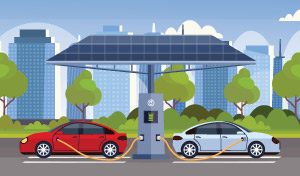Air and Our Environment
Sharon Koehler
Stone Industry Consultant

I have a very good friend who lives next door to me. She has asthma. (Asthma is a respiratory illness that makes it very hard for someone to breathe.) There are days that she struggles to breathe and she has to take A LOT of medicine. Asthma is not uncommon. You have probably seen commercials on TV for some different medicines to help people breathe.
As it turns out, quite a few people do have breathing issues. Some of it is genetics, but some of it is air pollution. The World Health Organization estimates that worldwide, over 4 million people prematurely die each year from air pollution-related health issues.
You might wonder… who is to blame? Unfortunately, everyone is. People really want to blame big business, especially when they see a big factory belching black smoke out of a smokestack, or a large fleet of gas-guzzling trucks headed down the highway. Yes, big business does merit some blame, but so do small businesses and individuals. We can all do a lot to help the air on this Earth.
Businesses both big and small can do things to help with air pollution issues.
- Maintain all your equipment. Fix small things before they become big things. This can help reduce emissions and also reduce the need for extra energy to run a faulty piece of equipment
- As your gas vehicles wear out, replace them with electric ones.
- As your other equipment wears out, look for “greener”, more environmentally friendly equipment such as electric forklifts, loaders or mini excavators.
- Look into and if possible, invest in renewable energy for your business. Granted, it may not be practical to put a row of windmills in your parking lot but the use of solar panels has been on the rise the last few years, so much so that now businesses can receive a tax credit for installing solar panels.
- Purchase rechargeable batteries instead of single use throwaway batteries. Tablets, laptops and cell phones already use rechargeable batteries. The charge gets low and you plug it in or put it on a wireless charging pad and POOF! the device recharges.
Not everything is like that, though. Wireless keyboards, label makers, mice and other office equipment can and often run on single-use non-rechargeable batteries. Switch those out for rechargeable batteries. Keep in mind that your non-rechargeable batteries should not just be tossed in the trash. They need to be taken to a battery recycling center if possible. Batteries that end up in landfills cause all kinds of environmental issues when they start to corrode. One Green Planet did a study and found that rechargeable batteries not only lasted longer but had 30 times less impact on air pollution.
- If you run the company, think about allowing your office employees to work from home. This issue has become a bigger deal with the onset of COVID, but it really does help. Less driving means fewer pollutants in the air. CNN reported earlier this year that during the pandemic lockdowns, 84 percent of the world’s countries saw improved air quality. Sometimes working from home isn’t practical for a business but if it is, why not?
 Just like businesses, individuals can also help fight air pollution.
Just like businesses, individuals can also help fight air pollution.
- Keep your car properly maintained. Some car issues can increase gas and oil emissions polluting the air more than a well-maintained car.
- If you are in the market for a new vehicle, consider a hybrid or all electric car or truck.
- If you have a fireplace, consider alternatives to burning wood logs. Faux logs emit less carbon monoxide into the air and are readily available at most stores. Fire pellets are another option to raw wood. They contain less moisture, so they burn longer and hotter than raw wood and they put less pollutants into the air. (You will need either a pellet basket or tray for your fireplace.) Other things to think about besides wood are gas logs, gel fuel, electric logs and bio-ethanol fuel.
- Like businesses, think about switching over to rechargeable batteries. Lots of things in homes take batteries. Remotes, thermostats, fire alarms and flashlights just to name a few. The initial expense is a bit more, but you make up for it in the long run with all the batteries you don’t buy.
Also, like businesses, think about going solar. Granted, upfront costs can be expensive, but you will be using clean, renewable energy that is much quieter than traditional heating/cooling equipment PLUS if it’s available in your area, you can sell your unused energy back to the utility company AND you can get a tax credit for installing solar panels on your home.
Do you have an outdoor grill? If it’s a charcoal grill, think about switching to a propane or gas grill. Gas and propane burn cleaner and don’t clog the air with fossil fuel contaminants
There are a lot more things that can be done to help make our air cleaner. There just isn’t enough room to list them all, here. But please remember, it’s the only air we have. We tend to take it for granted and assume it will always be there. The thing is, just because it’s there doesn’t mean it’s always good for us. We help our children with doctors. We fix our animals with veterinarians and our cars with mechanics. We need to help our air just like everything else. The good news is that we don’t have to rely solely on professionals. We can all do something to help.
Please send your thoughts on this article to Sharon Koehler at Sharonk.SRG@gmail.com.